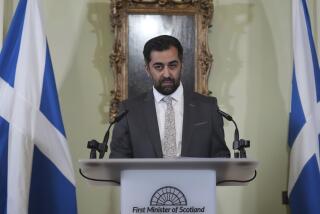Bid to Transform British Political Scene Near Collapse : Social Democrats Split, Owen Quits as Party Leader Over Issue of Merging With Liberals
- Share via
LONDON — A bold, six-year-old gamble to change the face of British politics appeared on the verge of collapse Thursday as the small Social Democratic Party split and its co-founder, former Foreign Secretary David Owen, resigned as party leader.
The split came over the issue of merging the Social Democrats with the Liberals, their partners in a loose political partnership that came to be referred to as the Alliance.
Owen, who had called on Social Democrats to reject the merger, resigned shortly after a ballot showed that the party membership had voted in favor of it, 57% to 43%.
“The whole thing is a great folly and a tragedy,” Owen said. “We are now deeply and predictably split, with sincere views on both sides.”
While the vote is theoretically only the first step in a process that still requires negotiations between the two parties and a vote of approval by the Liberals, it signals the end, at least in its present form, of the first new force in British politics since the Labor Party was founded in 1900.
Founded in 1981
The Social Democrats burst onto a deeply divided British polity in 1981 with unusual energy and verve. The party was founded by four idealistic moderate former Labor Party Cabinet ministers, known as the Gang of Four. Rejecting Labor’s drift into left-wing radicalism, the four--Owen, Roy Jenkins, William Rodgers and Shirley Williams--offered a more moderate brand of social democracy, one that stopped short of advocating unilateral nuclear disarmament and pulling Britain out of the European Communities.
It seemed ideally placed to fill the widening gap between an increasingly radical Labor Party and the unbending conservatism espoused by Prime Minister Margaret Thatcher.
It was also a fresh alternative to the noble but tired-looking Liberals, a party that has tried to claim the middle ground of British politics, yet finished a poor third in every election since World War II.
But the strong pull of traditional party loyalties, which in Britain tend to run through families for generations, prevented any widespread defection to the Social Democrats.
Strengthened by Alliance
To gain strength, they joined in the alliance with the Liberals in September, 1981. They ran together for the first time in the 1983 general election, collectively taking nearly 30% of the popular vote but managing to win only a handful of seats in Parliament.
Earlier this year, with Labor in apparent disarray, Owen declared that the Alliance was the only alternative to a third Thatcher term and confidently predicted victory in the June general election.
Instead, a relative debacle followed. To symbolize unity, Owen and Liberal leader David Steel had repeatedly made joint appearances, but the tactic confused rather than reassured the electorate and raised more questions than it answered about differences between the two partners. The Alliance won only 22 seats, compared to 24 in the preceding Parliament.
After the election, Steel and many Liberals advocated a merger and the Social Democratic ballot followed.
Prospects for Future
In the wake of Thursday’s results it seems likely that a slim majority of the party will end up being absorbed by the Liberals, while Owen will lead what remains.
Jenkins, now Lord Jenkins, who along with Rodgers and Williams advocated the merger, said he regretted Owen’s resignation, but said he believed it was the honorable course.
Owen, an abrasive, often overbearing personality who nevertheless is graced with a political flair and dynamism that propelled him into Parliament at age 28 and made him foreign secretary 10 years later, seemed philosophical rather than bitter about the ballot result.
“I’m very sad that Shirley, Roy Jenkins and Bill Rodgers haven’t stuck with us,” said Owen, the last of the Gang of Four who still has a parliamentary seat. “It takes time to break the mold of British politics.”
He vowed to keep his parliamentary seat and keep alive the remnants of the party he helped found.
“Don’t write me off, or the party, or social democracy,” he said.
More to Read
Sign up for Essential California
The most important California stories and recommendations in your inbox every morning.
You may occasionally receive promotional content from the Los Angeles Times.












